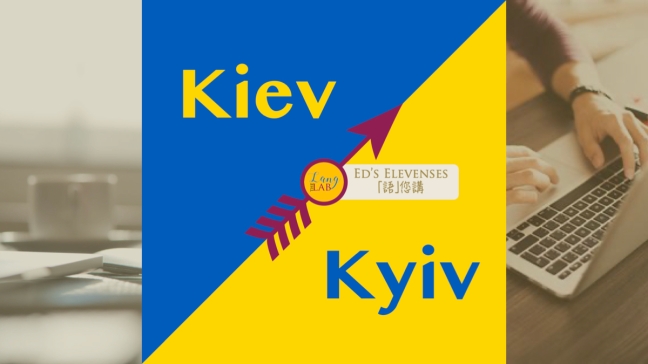Since the outbreak of the war in Ukraine, there have been a considerable number of posts on social media drawing the public’s attention to the language used whilst discussing the Russian invasion. In this Ed’s Elevenses blog post, I am going to talk about the name of Ukraine’s capital and let you know why its spelling matters, even for onlookers.
The TL;DR of all this…
“Kyiv” [kee–yiv] is what Ukrainians prefer to call their capital city, while “Kiev” [kee–yev] is the Russian variant.
Why are there different versions?
Ukrainian and Russian are both (east) Slavonic languages and they use Cyrillic scripts. The city’s name, however, is Ки́їв in Ukrainian Cyrillic and Киев in Russian Cyrillic; this difference can be attributed to linguistic evolution.
Such development over time is well exemplified by the alphabets unique to Ukrainian, for instance, the ї in Ки́їв, as well as by how vowels are pronounced, which differs from how Russophones would say them.
Given the varied Cyrillic scripts, when it comes to romanising the name—that is, transliterating it into Latin alphabet—it is “Kyiv” in Ukraine, “Kiev” in Russia.
When the city was under the rule of the Soviet Union, “Kiev” was the standardised spelling. As the internationally accepted name, it used to appear in publications, government correspondence, dictionaries, and the official names database of the United States Board on Geographic Names (to which the International Air Transport Association (IATA) refers).
From Kiev to Kyiv
When the Soviet Union collapsed in 1991, Ukraine gained independence and declared Ukrainian its official state language. Since English is the language of international diplomacy, the Ukrainian government had been pushing for the spelling change in favour of the Ukrainian transliteration; in 1995, the spelling “Kyiv” was officially approved and adopted for government use.
The majority of Ukrainians consider the name “Kiev” as a relic of the country’s Soviet past, which also appears to have become even more distant when Viktor Yanukovych, the pro-Russian leader, was ousted in 2014.
Fast forward to 2018, the “KyivNotKiev” campaign (#KyivNotKiev on Twitter) was launched by the Ukrainian Ministry of Foreign Affairs in an attempt to seek international approval for the name of its capital city, citing that: “The usage of Soviet-era place names – rooted in the Russian language – is unacceptable to the people of Ukraine.”
The impact of the campaign was positively encouraging, as the US and UK governments, as well as the IATA making “Kyiv” the only name for standard use. Moreover, the Associated Press (AP)—the leading provider of copy to English media outlets globally—was the first to make the change and stated: “We regard the Ukrainian spelling of Kyiv as an important adaptation because it is linked to Ukraine’s present status.”
Kiev or Kyiv?
“Kiev” is associated with the Russification of Ukraine, which appears to be outdated; therefore, it is “Kyiv” for writing or “kee–yiv” for speaking.
How about the food dish—chicken Kiev or chicken Kyiv?
Well, I did notice that people online have been pushing for the switch from the former to the latter. I would personally prefer the latter. However, editors might need to take note that it is still “chicken Kiev” if you are required to follow the AP Stylebook.
Language matters—even more at times of crisis. By understanding the background and the difference between Kiev and Kyiv, we can make use of our linguistic capacity to express solidarity with the people of Ukraine and show respect for their language and identity, which, I believe, is one of the many ways to support and contribute.
Whilst you are here…
Did you know there are more than 20 languages spoken in Ukraine? If you can, please share, like, and support Translators without Borders with their urgent appeal to raise emergency funds for offering Ukrainians critical communication support as they flee invasion. Together, we can help those affected by the war to get the information they are looking for and communicate their needs in a language they understand. Thank you.
Edison Tam MA MCIL CL is a Translator, Proofreader, and Copyeditor (zh-hk/en) who works with students, independent non-fiction writers, academic researchers, and clients from businesses and organisations of all sizes.
He is Chartered Linguist and Member of the Chartered Institute of Linguists (CIOL), and has undergone wide-ranging academic training in Business, Modern Languages, and Applied Linguistics in Hong Kong, London, and Barcelona.

